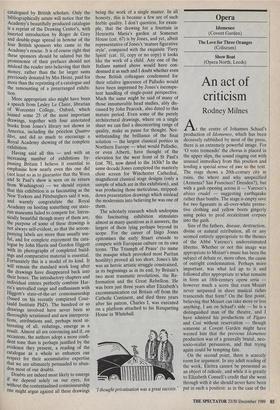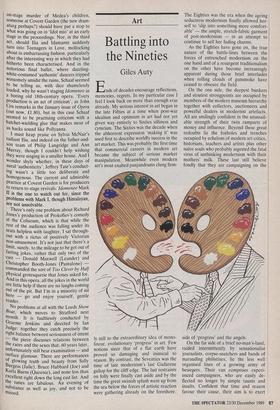Opera
Idomeneo (Covent Garden) Show Boat
(Opera North, Leeds)
An act of criticism
Rodney Milnes
At the centre of Johannes Schaaf's production of Idomeneo, which has been decisively rubbished by most of the press, there is an extremely powerful image. For `0 voto tremendo' the chorus is placed in the upper slips, the sound ringing out with unusual immediacy from this position and lending a special sense of awe to the text. The stage shows a 20th-century city in ruins, the where and why unspecified (Armenia? San Francisco? Dresden?), but with a gash opening across it — Varesco's abisso crudel — suggesting earthquake rather than bombs. The stage is empty save for two figurants in all-over-white protec- tive clothing and yellow boots gingerly using poles to prod recalcitrant corpses into the gash.
Sins of the fathers, disease, destruction, divine or natural retribution, all or any seemed entirely appropriate to the themes of the Abbe Varesco's underestimated libretto. Whether or not this image was appropriate to Mozart's music has been the subject of debate or, more often, the cause of outright condemnation. Perhaps more important, was what led up to it and followed after appropriate to what remains in form an 18th-century opera seria — bowever much a score that even Mozart never surpassed in sheer musical riches transcends that form? On the first point, believing that Mozart can take more or less anything, I am on Schaaf's side — he is a distinguished man of the theatre, and I have admired his productions of Figaro and Cost without reservation — though someone at Covent Garden might have warned him that the previous Idomeneo production was of a generally brutal, neo- socio-realist persuasion, and that trying again could be tempting fate.
On the second point, there is scarcely room for argument. In any adult reading of the work, Elettra cannot be presented as an object of ridicule, and while it is greatly to Elizabeth Connell's credit that she went through with it she should never have been put in such a position: as in the case of the on-stage murder of Medea's children, someone at Covent Garden (the new dram- aturg perhaps?) should have put a stop to what was going on in 'Idol mio' at an early stage in the proceedings. Nor, in the third act, should Ilia and Idamante suddenly turn into Teenagers in Love, mollocking about in embarrassing fashion, particularly after the interesting way in which they had hitherto been characterised. And in the notorious final ballet, where dazzling- white-costumed 'authentic' dancers tripped winsomely amidst the ruins, Schaaf seemed to be telling us, with dice shamelessly loaded, why he wasn't staging Idomeneo as a boring old 18th-century opera. 'Every production is an act of criticism', as John Cox remarks in the January issue of Opera (out now, £1.80), but in this case Schaaf seemed to be practising criticism with a hatchet-wielding glee that makes most of us hacks sound like Pollyanna. I must heap praise on Sylvia McNair's radiant Ilia, and indeed on the father-and- son team of Philip Langridge and Ann Murray, though I couldn't help wishing they were singing in a smaller house. And I wonder shyly whether, in these days of aural 'authenticity', Jeffrey Tate's conduct- ing wasn't a little too deliberate and homogenous. The current and admirable practice at Covent Garden is for producers to return to stage revivals: Idomeneo Mark II is the one to watch out for, since the Problems with Mark I, though Himalayan, are not unsolvable.
There's only one problem about Richard Jones's production of Prokofiev's comedy at the Coliseum, which is that while the rest of the audience was falling under its seats helpless with laughter, I sat through- out with a rictus of positively Victorian non-amusement. It's not just that there's a limit, surely, to the mileage to be got out of farting jokes, rather that only two of the cast — Donald Maxwell (Leander) and Christopher Booth-Jones (Pantalone) commanded the sort of Too Clever by Half Physical grotesquerie that Jones asked for. And in this opera, all the jokes in the world are little help if there are no laughs coming out of the pit. But I'm in a minority of nil here — go and enjoy yourself, gentle reader.
No problems at all with the Leeds Show Boat, which moves to Stratford next month. It is faultlessly conducted by Graeme Jenkins and directed by Ian Judge: together they catch precisely the right balance between seriousness of intent the piece discusses relations between the races and the sexes that, 60 years later, unfortunately still bear examination — and surface glamour. There are performances of glowing truth and beauty from Sally Burgess (Julie), Bruce Hubbard (Joe) and Karla Burns (Queenie), and none less than excellent right down the long cast list. And the tunes are fabulous. An evening of substance as well as joy, and not to be missed.











































































































 Previous page
Previous page